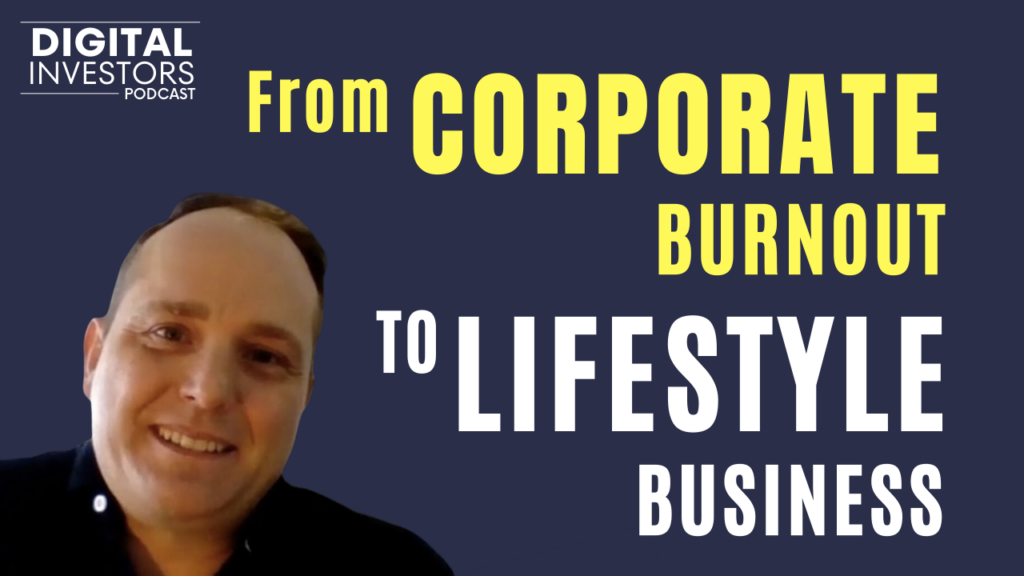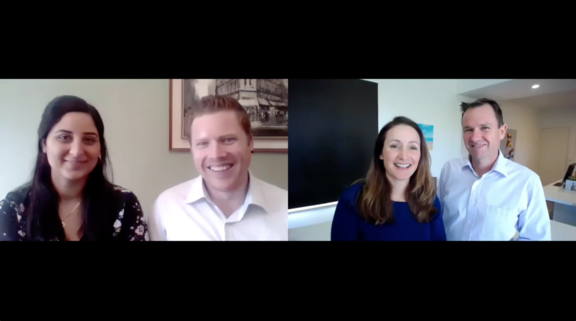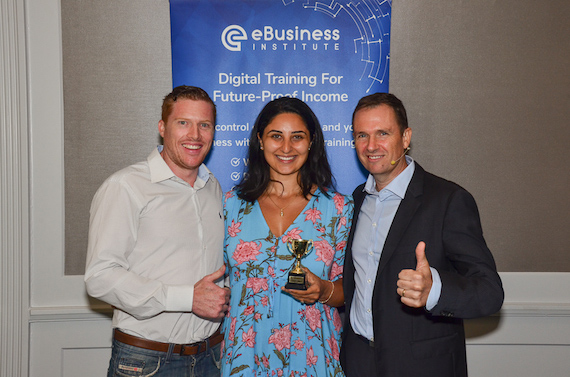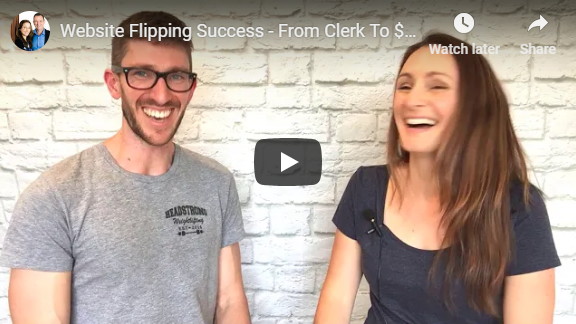See how David set up a lifestyle business after 30 years of being a burnt-out corporate…
Two years ago, David reached a point in his life where he was drained physically and emotionally by the relentless demands of his corporate job.
The final blow came when two of his team members were abruptly let go. Fearing he was next, he faced a pivotal choice. Instead of diving back into corporate life, he took a courageous leap.
Today, you’ll meet David, a resilient man who transformed his life and became a thriving lifestyle business owner.
If you are or know someone battling burnout, this interview is a beacon of hope—a testament to human resilience and the power of reinvention. Click below to watch it now.
Matt Raad: Hello again, everyone. Welcome to the Digital Investors Podcast. I’m your host, Matt Raad, and today I’m really excited to have one of our star graduates, David, who has just completed his second year with us.
David has an interesting story because, unlike most of our community, he came onto our program with a lot of experience, particularly in the digital space. He already knew about how to build websites.
But here’s what’s interesting about David’s story. He was maybe like some of you reading this, a burnt-out corporate. You’re going to read how he was able to transition into doing this.
David now builds professional websites for businesses in Brisbane. He’s charging anywhere from $6,000 up to $20,000 and beyond for website builds. So, we’re going to see how he’s doing that. He’ll share some specific little techniques he’s using and any tips he’s got for those of you who are total beginners.
So, David, thank you so much for sharing your secrets today.
David: I’m happy to help.
David joined the Digital Investors program, even though he already had online experience
Matt: David, it’s an interesting background where you started from. I want to share some of the direction you’ve taken with the strategies we teach here at eBusiness Institute.
Can you start by sharing your background and why you joined the Champions program?
David: I have 30 years of corporate communications experience under my belt, and my journey began in broadcast TV. Around 20 years ago, I even dabbled in a Dreamweaver web multimedia course. However, I used this as a stepping stone to venture into the realms of public relations and communications management.
I pursued a master’s degree and focused predominantly on managing web teams and graphic design units. I was also overseeing various projects with a team working under me.
He wanted to find a way to find a way to use his digital skills to create an online business
David: But I reached a point where burnout had taken its toll. I was utterly drained, both physically and emotionally. This exhaustion had been building up over eight or nine months, compounded by a moment when I was blindsided by the news that two of my team members were being let go with just five minutes’ notice. That’s just life in the corporate world, and it seemed like my turn was next.
I could have easily jumped back into another corporate role, but I needed a break. I needed time to recharge and reassess my path.
My partner also had enough of watching me go through the motions. So, I aligned my skills with a new direction. I found a way to tweak what I had been doing all along, harnessing those same skills slightly differently. I chose to work for myself, using my existing skill set but in a new, fresh way.
Matt: Awesome. So, you had 30 years’ experience with this type of background. Yet you still came to study with us at eBusiness Institute. As you know, we are experts at training beginners online, particularly corporate people like yourself, with digital skills.
David’s took the skills he learned from WebDev to build a website for his brother
Matt: If we step back two years, what did you focus on first? Can you tell us about the first website build you used to get going with this? You obviously followed our process to gain the foundations. Was that the first website you built?
David: It all started with my brother. One day, he had enough of working for his boss. He called me that evening, saying he wanted to start his own thing and needed a website.
He expected it to be ready in a day or two, even though he hadn’t provided any content or context. But, oddly enough, this turned out to be a blessing in disguise for me. I had just completed the WebDev course, and I tend to learn when I’m physically doing a project, rather than just learning the theory.
He then used his new digital skills to build websites for other local businesses…
David: The real value I found in the WebDev course was in SEO research and market analysis. It helped me pinpoint where my brother should focus his business and where the market demand was.
It’s a shame he didn’t want to operate on the Sunshine Coast in Queensland because there was a high demand for his services. But overall, things worked out quite well.
The website I built for him ranked quickly on Google. From memory, it was even competing with his former employer within three months. I was really pleased with that outcome, and it taught me a lot.
I applied these skills to refine the service offering for local businesses, and things kept improving from there, going from strength to strength.
Matt: That’s perfect because here you are. You already know how to build websites. You’ve even used Dreamweaver before.
But then you started our WebDev Accelerator course, which is our program for teaching you how to build a really good website. And I remember working with you, David, on that particular website with our web reno session. I really liked what you did, and you did it so well.
But then you also went down the rabbit hole on the SEO side. You built the website straight away – that was easy for you. I didn’t have to teach you anything there. But for the SEO bit, you and your partner, Kim, were pleasantly surprised by how quickly you were able to rank the site.
David learned how to SEO small business websites
Matt: And as you said to me at the time, you didn’t have to worry about the technical side of things. You focused more on understanding marketing, SEO, and how to approach small businesses. Was your main focus about figuring that out?
David: I’ve come from a very strong writing background for corporate comms. But when you’re writing for large corporations, some are so big they don’t actually care whether they rank or not for a particular product or service. Or they’re so big they’ll get the media coverage anyway.
But when you’re working for a smaller outfit or your own website, and you are fighting against a lot of other fish, then you’ve really got to pay attention to the SEO.
So, there’s a different way of thinking and weaving. I mean, the corporate Dave wouldn’t write some content like I write now. And even some of the SEO sub-headings, you just wouldn’t do it.
There are also often six, seven, or eight fingers in the pie when drafting a piece before it gets out with a big corporate. But I can get content out pretty quickly with a bang on my own sites.
So, it depends on the market and what your aim is. And for me, obviously, this group is about ranking quickly on Google and generating customer leads or affiliate income, etc.
How David is able to charge $10,000+ for business website builds
Matt: So, you came from a corporate background. Then, you worked on your first website, which was your brother’s. It was a relatively small site for a small business here on the Sunshine Coast in Queensland. How did you go from there to where you are today?
Within two years, you recently charged $22,000 for a website build. What was your progression to get to this point with your Brisbane Digital Marketing Solutions?
I’m sure there are many people reading this who are also from a corporate background. So, how did you crack into the market of building websites for medium-sized businesses where you’re charging $10,000+ for a website build?
David: Well, even for small players, my minimum charge would still be $6,000. But I offer a massive amount of value that a lot of the competition doesn’t offer.
For example, I like to include a Google Business Profile as a standard. I also include a news feed with the blog posts. And when the website is built, I automatically put the Google Reporting in. I would then post articles onto the client’s Google Business Profile and social channels to add extra value.
He has the confidence in how to work with larger businesses and corporates
David: There’s been an evolution in how I deliver websites for local businesses, which really helped me join BNI. Initially, I held off joining because I felt, “Oh my goodness, there’s so much to learn. I don’t want to join something else.”
But I joined when I was comfortable with the technical side. And then all the corporate communications, writing and problem-solving just came to par.
In reality, when you work for large corporates, they’re just individual teams with buckets of money. They have a specialisation in particular areas. And quite often, they have no clue what they’re doing with their communications. And from a comms point of view, you’re working with small businesses in large corporations.
I just applied my new skillset, and soon after joining BNI, I got the $22,000 client.
He beats his competition by assessing and understanding his clients’ online needs
David: Shortly after, I got my second website build through my local BNI chapter. And the background there was I’d worked as a sales and marketing manager for an import distributor firm. I’d previously worked in broadcast television, so I know how to write technical, scientific pieces.
This client is an import distributor for thermal cameras. And because of my background, I really understood them. No other web developers got them at all.
I was able to turn around a website that was taking 29 seconds to load. It was loaded on a US server, which should have been Australian for local speed. And it had been hacked. So, they weren’t getting any leads of it.
The client was able to make back what I had charged them for a year (including ongoing SEO work) within two months from the leads we were able to generate for them. So they loved me! In fact, we’re talking at the moment about a closer relationship and how I can help grow their business with new income streams. So, it could be quite positive there.
Matt: Yes, that’s quite positive. I like that.
How local business networking helped David grow his Digital Agency
Matt: I’ll just explain for our readers who might not know – BNI is a business networking group here in Australia and overseas. And as part of Champions, we encourage you to join a business networking group of some kind.
And as you say, David, you quickly found some good clients there. Has that been a good lead referral for you, then?
David: Yes, well, I never did the 100 Call Challenge you set in the Champions group. I think because I have years of working in sales and marketing, I’ve done a lot of cold calls already. And my agency website ranks well. So, I haven’t gone out of my way to do any advertising, cold calling, etc. I don’t need to.
He identified his specialty niche by partnering with IT businesses
David: I do get a lot of referrals, and a lot of them come from IT. These are companies that are typically wary of Web Developers and SEO-type people. There are a lot of cowboys out there who charge a fortune for hosting, and they just copy competitors’ content, etc. They don’t look after their clients, and it’s pretty bad behaviour.
And so, when they do actually find someone they can trust to look after them and their clients, it’s a big deal for these companies to hand over their clients for services they don’t want to provide themselves.
Typically, my clients do B2B managed services, outsourcing their IT needs. They often ask me to do a web review, which tends to result in a large number of paid projects through referrals.
During these web reviews, I not only assess their website, but also help them gain clarity on their brand’s positioning, their overall perspective, and what their competitors are up to.
I’m often surprised by how frequently businesses misjudge their competition. They’ll mention competitors A, B, and C, but my research often reveals it’s more like X, Y, and Z.
Often, I’ll uncover emerging trends that could be real game-changers if they jump onto it quickly. So, there’s a lot of extensive research that goes into it, which allows me to provide strategic insights. But it consistently leads to a lot of new clients.
Matt: That’s something I’m really impressed with what you do, David. As you said, your journey has evolved over the last two years, and this is one of the strategies you’re publicly sharing here.
He provides an in-depth review to show potential clients where he can add value to their business…
Matt: Would you say that this initial consultation, where you’re looking at the marketplace and doing the keyword research that we teach here, is leading to these bigger website builds?
David: For any type of referral, the first thing I do is run the domain through Google Page Speed. And the information I get from that is gold.
I look for common elements such as if a client’s site has a 10 or 20-second delay for a full load of their website, they’ve got a low Google page speed score, they’re using large-format JPEGs, or have excessive CSS or JavaScript coding, or the website hasn’t been optimised etc. I’m able to point these things out to the client.
It’s even better if I can point out to a client if their site hasn’t been built properly for mobile phones, the content’s spreading over the side of the screen, or it’s too slow to load, etc.
But if I need to go deeper into a more detailed report, then I offer a free Skype call.
David has set up a lifestyle business after being a burnt out corporate
Matt: And you’re doing all of this from home. So, this is a lifestyle business now for you and Kim. There is no more commute for you anymore.
You’re working from home while doing these reviews and chatting to clients. Are you doing anything face-to-face?
David: No. In fact, I’ve never met clients in person that have paid me serious money. But I really should someday.
I have never physically met some people, but we have this in-depth trust.
And if I think about it, pretty cool. I’m setting up the Google reporting and going into their socials; they’re handing over a lot of logins. So, there’s a lot of trust there.
But I treat those relationships as a goal to build a good rapport. And I do actually like the BNI philosophy of giver gain. I noticed that you and Liz do it as well, “Give more than you expect to receive.” It’s been really useful because people value that service.
Matt: Really well done here. Just two years ago, you were a burnt-out corporate who spent 30 years in a full-on role.
He works from home and doesn’t have to meet clients face-to-face
Matt: But now you have a lifestyle business you’ve set up from home. You work with clients you’ve virtually never met, but they trust you implicitly to do a good job for them. And you’re achieving awesome results for them.
You’ve now settled into this and found your sweet spot here. I know this is a loaded question, but do you and Kim now enjoy this way of life more than when you were in corporate? Have you noticed other changes in your life?
David: Oh yes. I no longer waste an hour getting ready and putting on a suit in the morning. My goodness, I couldn’t stand that now! I’ve got two suits in the cupboard that I haven’t worn in over two years. And I don’t miss all the politics and all that nonsense.
David’s tips for local business networking to grow your online business
Matt: David came onto this program with quite advanced technical skills. But as you can see, he’s just blitzed it.
David, you do such good websites for your clients and look after them. You’re also really good at SEO, which is a new skill for you.
So, looking back over the last two years, what would be your advice for our readers who are just starting out and who maybe don’t have the technical skills you did?
Tip #1 – Join a chapter in an area you want to work in
David: I would suggest joining a BNI chapter. But be selective about which BNI you choose. I remember you gave me sage advice about going closer to the city and where the bigger businesses are.
One thing I found was that more established BNI’s had split up the web developer seats from SEO and Digital Marketing, etc. And my lesson in that environment is that it hurts your opportunity to really sell your skillset.
Inevitably, I found that by choosing a BNI chapter that didn’t have anyone in that realm yet, I could negotiate that no other SEO or Digital Marketer could come in. Otherwise, you run out of things to say and miss a good opportunity.
Tip #2 – Work on your one-minute elevator pitch to showcase your core services
David: In BNI, you have to do a one-minute pitch each week. It’s a good opportunity to talk about different things. So, I’ve talked about all sorts of leading topics that lead back to my core services.
I’m able to talk about Google Business Profiles, Google Ad Campaigns, different marketing strategies, etc. And it all leads back to my core services. So, finding a BNI chapter that doesn’t have established players so you can build your brand is really important.
Tip #3 – Have your business systems setup so you can handle new work
David: I’d also say that I wasn’t comfortable joining until I had my systems in place. I’m actually surprised how many BNI members are very new in their space. I assumed they’d be much more established so you can grow and build trust with people.
Matt: That’s something I noticed about you, David, when you first got into all this. You spent a lot of time learning what we teach and dialling into the foundations before joining your first BNI.
You can join any business networking group. It doesn’t matter which one, just look in your local area. There’ll be some form of business networking group.
So, a big thank you, David, for sharing some of your insights because your journey is so different.
Want to create your own lifestyle business online?
Matt: If you’re interested in learning about building or buying websites, go and check out our free masterclass. And if you want to start where David did, learning the basics of how to build a really good website, consider joining our WebDev program.




